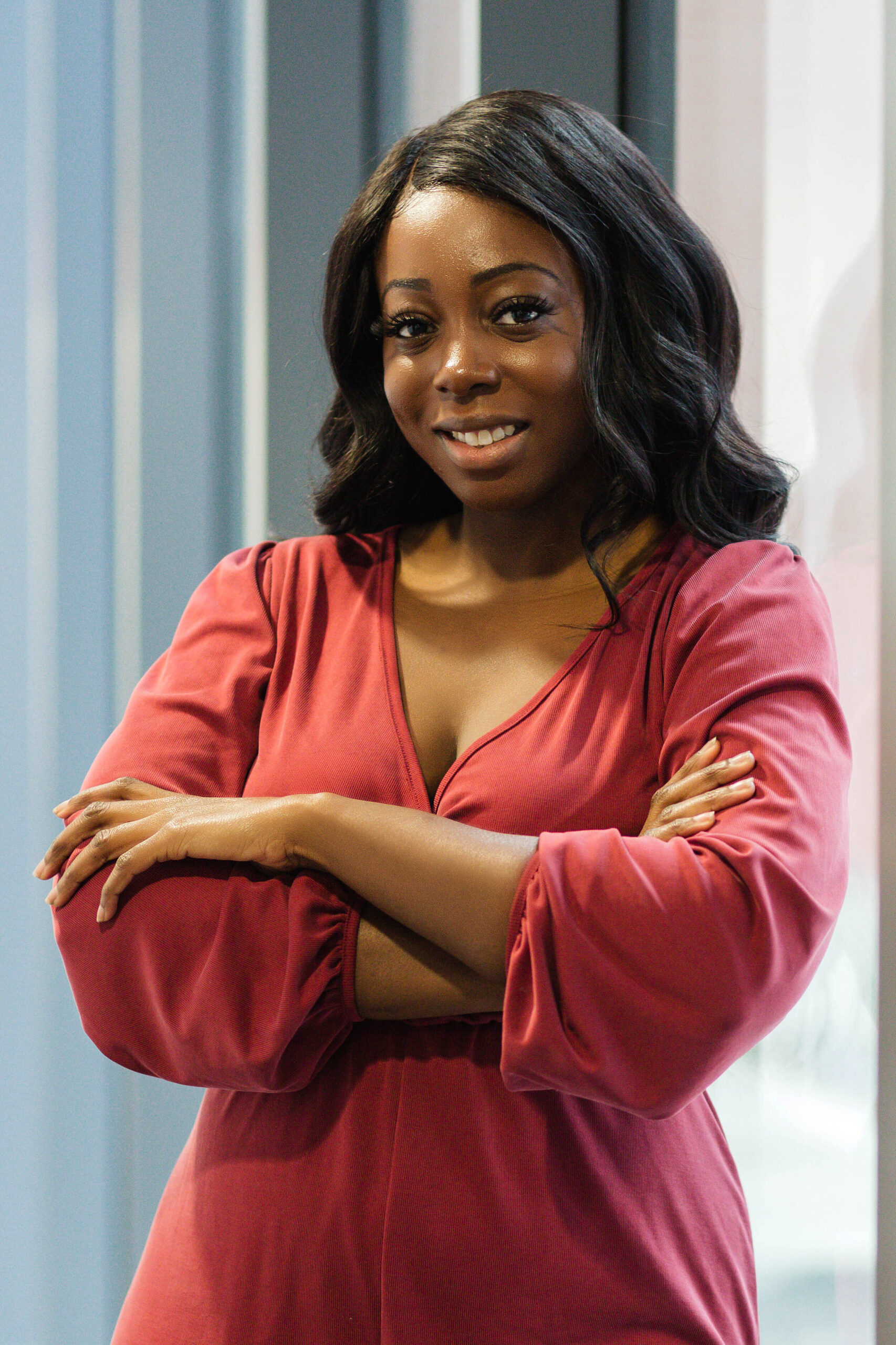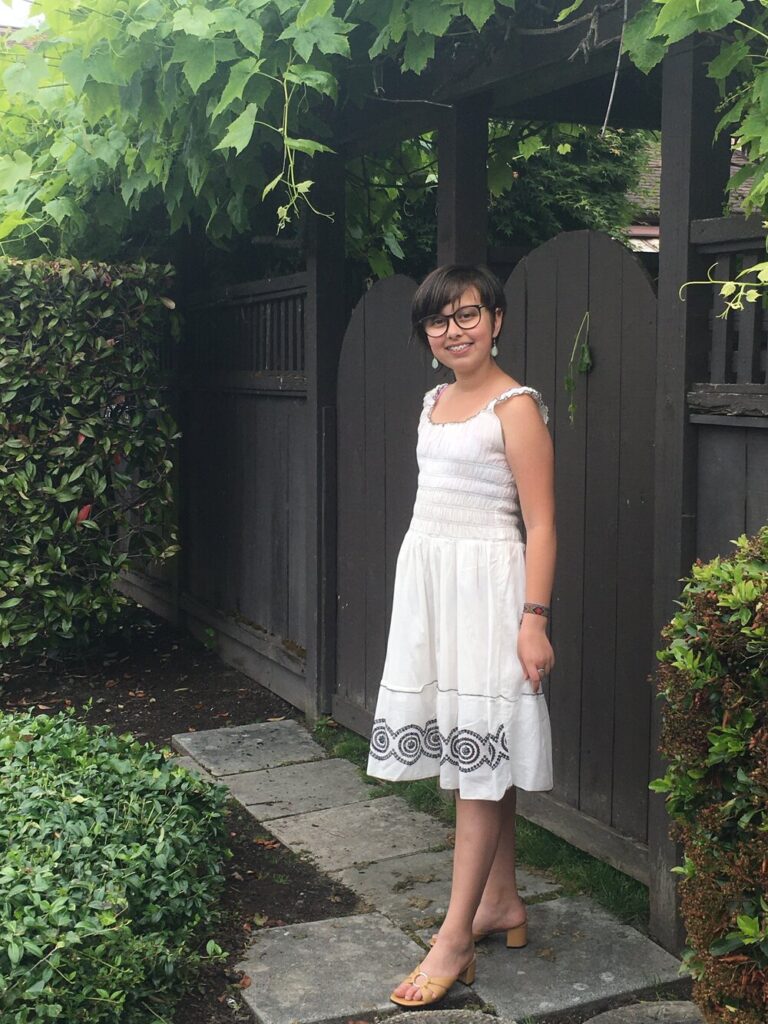Rosie shares about her desire for there to be more representation of Black healthcare professionals within the Canadian healthcare system. Rosie’s goal is to help others achieve good health and access to food.
This is Rosie Mensah
Registered Dietitian, Nutrition Communicator,
Food Justice & Health Equity Advocate.
The main reason why I wanted to go into nutrition and well being was because I wanted there to be more representation of Black healthcare professionals within the Canadian healthcare system. Growing up, I did not encounter Black healthcare providers, yet I would always see Black people and other racialized people as the ones experiencing poor health, nutrition-related chronic illnesses, and poverty. I wanted to make a difference in my community and leverage my lived experiences to help others achieve good health and access to food.

1. What inspired you to learn about healthy eating?
The main reason why I wanted to go into nutrition and well being was because I wanted there to be more representation of Black healthcare professionals within the Canadian healthcare system. Growing up, I did not encounter Black healthcare providers, yet I would always see Black people and other racialized people as the ones experiencing poor health, nutrition-related chronic illnesses, and poverty. I wanted to make a difference in my community and leverage my lived experiences to help others achieve good health and access to food.
It is funny because for a long time wanted to pursue cosmetology and become a hairstylist and makeup artist! I still have a passion for hairstyling and skincare, but as a teenager, I somehow shifted to developing a passion for health and decided to pursue dietetics. In high school, I began to recognize how powerful food was in our lives and our health outcomes. Also, I began to become more aware of how food brings us together, demonstrates cultures, connects people from across the world, and how it is a central part of human life.
2. How do you think confidence relates to healthy eating?
I think there are many ways confidence can relate to healthy eating. We live in a world where there are many different dietary behaviours, different cuisines, different cultures, and different backgrounds, and I think that a big part of healthy eating and confidence is understanding that food should be looked at holistically.
Food is more than the nutrients it provides, and it is important to consider how we eat, why we eat, and what we eat. All these considerations impact our relationship with food, and I think that having a healthy and enjoyable relationship with food can help with your confidence. I think confidence can come from having this understanding and being aware and okay with what you eat, your connection to the food, and how you feel about yourself and your diet.
3. How do you tie your passion for social justice into your daily life?
Well, social justice is a part of all my experiences. I believe just who I am, and how I show up in the world as a young Black woman with my lived experiences showcases social justice in my daily life. Growing up in a single-parent household, living under the poverty line, experiencing food insecurity within an over-policed community, and still existing in this world trying to make a positive impact is a form of social justice for me.
It comes out daily in my work, the topics that I speak about, the content that I share; social justice is part of my values. I am a human being and I am not perfect, but I try to be intentional about the work that I do and what I get involved in. This includes what I share online, the organizations that I volunteer with, the policies and positions that I advocate for, and so on. I try to make an effort and think about how I can make the world more equitable in my day to day life, and being authentically me with my experiences and my passion for making the world a more inclusive and equitable place allows me to incorporate social justice into my daily life.
4. How has leading a healthy lifestyle allowed you to build more confidence and self-love?
When we start to focus too much on what society says or what mainstream media is portraying as beautiful or ‘healthy’ we can start to feel bad about ourselves if we do not fit into that category. When I eat nutritious foods that fuel my body and nourish not only my body but my mind and spirit, I felt like I am doing something good for myself, I feel like I am showing myself, love.
Along with trusting my intuition and critically reflecting on science, I can better understand and define what ‘healthy’ looks likes to me. Being introspective and reflecting helps me to build self-confidence because it strengthens my ability to trust myself.
Also, I understand that what we eat not only impacts how our body functions, it can impact how our minds work, our skin health, and our overall health. For example, when I saw that the food, I ate influenced my skin, and by making it bright and glowy, it helped me feel more confident about my lifestyle choices.
I believe that a big part of self-confidence is critically reflecting on what you have been taught to think about what is ‘good’ or ‘beautiful’ when it comes to how you look or how you eat and be consider who is sharing that message with you. Being mindful, paying attention, and doing what feels right for your body and mind can be a great start on your journey to loving yourself. It is so important to explore how you feel about yourself and your mindset.
5.What has been the biggest challenge in your career, and how did you overcome it?
Well, I am fairly new in my career and I have only been practicing as a dietitian for 2 years! But, what I can say was the biggest challenge during my first year as a dietitian was finding a job.
When I first graduated from my Master of Public Health program combined dietetic internship, I could not find a job. I found a part-time, temporary position that was a 6-month contract for 2-3 days a week. That was it.
I remember feeling so bad about myself during that time and I was often very disappointed because I thought that graduating from a prestigious university and being a registered health professional would help me get a job after graduation. That experience had a huge impact on my confidence during that time and forced me to take a step back and assess my situation, although it was an extremely uncomfortable process.
What helped me move past this challenge was reframing my mindset and considering my skillset. I had to ask myself “what are my transferable skills?”, “what do I want to do long-term?”, “what can I do with my degree/designation?”.
I knew I wanted more for myself as a dietitian and wanted to build a brand and a business. While I was in that part-time temporary contract job, I started researching entrepreneurship and ‘side hustles’ to build my brand and supplement my income. After experiencing so much anxiety and rejection from my job searches, I decided that I could not rely on employment positions that did not exist continue to bring me down. I did not think I would pursue entrepreneurship so quickly, but it came out of a necessity, which is often the story for many women of color.
I am happy that I am building a business now, and that I can control my impact and income.
6. How can educating youth about health and nutrition better their future?
Great question. I believe that educating youth from a young age about health is so important because the beliefs, habits, and perspectives from younger ages often come with us into our adult life. If youth begin to learn about health and engage in healthy habits from a young age, they can take them it with them for the rest of their lives.
Sometimes it can be difficult for older people to consistently apply new habits (it is possible of course!) because they are comfortable with the way they’ve been doing things for decades, but in our childhood or as a youth, there is a unique ability to pick up things quicker and make them applicable. Starting from a young age and learning these tips now can help youth live longer healthier lives in the future.
Additionally, teaching this to youth can allow them to explore different career paths. Maybe some youth are interested in health and wellness and want to go into careers in the health and wellness field. Health and wellness can be an amazing industry to work in!
7. What is your favourite recipe?
That is a tough one because I love food! But I would have to go with fried plantain and red red stew. This is a traditional Ghanaian dish including fried plantain and a red stew with black-eyed peas. This is a dish that I grew up and eating and still enjoy eating today. Plantains are one of my absolute favourite foods and I enjoy them any way you cook them. I love how versatile they are and how you can find them as part of cuisines from around the world.
It is hard to call this my favourite food because I like so many foods, but it is one I can eat again and again!

Written by Ameya Wagner
BeaYOUtiful participant. Aspiring journalist and author.
